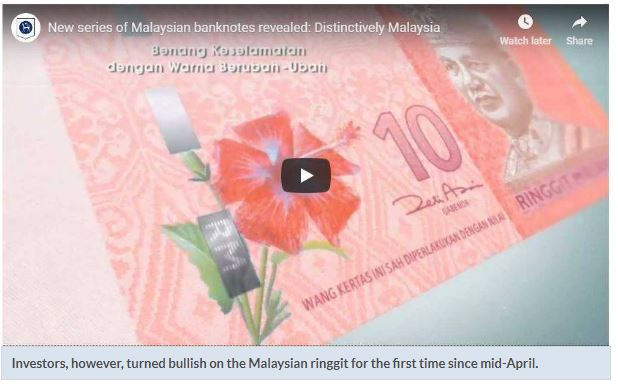Asian currencies seen under pressure but investors bullish on ringgit
BENGALURU: Investors turned more bearish on some Asian currencies and trimmed long bets on others over the past two weeks, a Reuters poll showed, as caution prevailed over prospective further dovish approach by key global central banks and their Asian counterparts.
Investors, however, turned bullish on the Malaysian ringgit for the first time since mid-April.
Bearish bets on the Chinese yuan, the South Korean won, the Singapore dollar and the Taiwan dollar rose, while long positions narrowed for the Indonesian rupiah and the Thai baht.
The fortnightly poll of 13 participants was closed before the U.S. Federal Reserve rate-cut decision on Wednesday. The 25 basis points reduction had been largely priced in by the markets.
The rate-cut, its first in more than a decade, was however followed by Chairman Jerome Powell’s statement that the move might not be the start of a lengthy campaign to shore up the economy against risks.
Last month, central banks of Korea and Indonesia had cut interest rates, while the European Central Bank and the Bank of Japan kept the door open for a reduction option while holding rates steady in their respective policy meetings.
Policy makers across the globe are firefighting to tackle global growth worries amid the festering Sino-U.S. trade spat, while most major Asian economies are further bruised by cooling demand from key regional trade partner China.
Most Asian currencies are also under pressure with factory activity in the continent on shaky ground as global demand remained subdued and China’s stimulus measures were yet to show their full pulling power.
Fuelling further fears of a slowdown, profits earned by China’s industrial firms contracted in June after a brief gain the previous month, while factory activity shrank for the third straight month in July.
Short positions on the won, the worst-performing Asian currency so far this year with a 6% decline, were at their highest since mid-June.
South Korea’s exports tumbled for an eighth straight month in July, with persistently weak global demand and an escalating dispute with Japan painting an increasingly gloomy picture for Asia’s fourth-largest economy.
Bearish positions rose for the Taiwan dollar too and like South Korea, Taiwan’s economy also relies heavily on its technology-oriented exports, and has seen economic headwinds due to a slowdown in demand for the like. Long positions on the Indian rupee rose for a second consecutive poll.
The Reuters survey is focused on what analysts believe are the current market positions in nine Asian emerging market currencies: the Chinese yuan, South Korean won, Singapore dollar, Indonesian rupiah, Taiwan dollar, Indian rupee, Philippine peso, Malaysian ringgit and the Thai baht.
The poll uses estimates of net long or short positions on a scale of minus 3 to plus 3. A score of plus 3 indicates the market is significantly long on U.S. dollars.
The figures included positions held through non-deliverable forwards (NDFs). – Reuters
Source: https://www.thestar.com.my/business/business-news/2019/08/01/asian-currencies-seen-under-pressure-but-investors-bullish-on-ringgit#7HqYjlcyC5UrzVgB.99


 English
English




